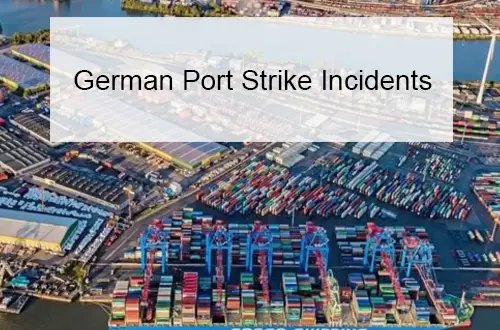Pay Attention to Adjusting Transportation Plans: German Port Strike Incidents
I. Overview of German port strike incidents
Starting at 5 a.m. on June 17, 2024, strikes occurred in several major international shipping ports in Germany.
The strike is part of an ongoing dispute over wages and working conditions. The direct cause of the strike is that the deadlock in labor-management agreement negotiations cannot be broken. The German Verdi trade union decided to launch a warning strike to convey their demands to the employer. Ver.di demanded an increase of 3 euros (3.21 U.S. dollars) per hour from June 1, a corresponding increase in shift allowances, and an extension of the collective agreement period by 12 months.

The strike seriously disrupted maritime transport and affected inbound and outbound freight operations. This action was a response to long-term negotiations with port employers, who proposed insufficient salary increases, especially considering the high inflation rate.
II. Participating ports and strike time
The ports involved in the strike include Hamburg, Bremen, Breck, Emden, etc. These ports are important nodes in the German and even European trade networks, resulting in serious backlogs of goods in these ports.
The strike in Hamburg began at 5:00 a.m. local time on June 17, 2024, and will last for approximately 24 or 48 hours, depending on the location of the port, until late at night on June 17 or June 18, 2024.
III. Impact and consequences
The strike has brought cargo and container handling at these ports to a near standstill, putting great pressure on the entire logistics chain.
Maersk and other large shipping companies have warned that their services will experience widespread disruptions and delays due to the German port strike, especially on routes to and from Finland. Rail freight operators such as METRANS have also warned customers that backlogs and disruptions will continue to worsen as supply chains have already been strained by recent floods and rail strikes in Germany.
These disruptions are expected to continue after the strike ends as ports work to eliminate accumulated delays. The employers' association criticized the strike as irresponsible, arguing that global supply chains are already strained and logistics bottlenecks remain.
IV. Measures to be taken during transportation
The strike reflects the fierce differences between labor and management in the negotiation of the agreement in German ports. In the future, the two sides need to resolve their differences through further communication and consultation to avoid the recurrence of similar incidents.
For shippers and freight forwarders, it is necessary to pay close attention to the latest developments of local strikes and adjust inland transportation plans in a timely manner to cope with possible delays and losses.
Assess the potential impact of strikes on ships and shipping schedules, adjust voyages and choose other ports for docking according to actual conditions to minimize the impact on shipping schedules and avoid cargo delays. In the event of an emergency, alternative ports or other modes of transportation can be activated to ensure that the goods can be transported smoothly.
Prepare goods in advance to ensure sufficient inventory to cope with possible transportation disruptions. At the same time, optimize inventory management to reduce unnecessary inventory costs. Consider using multiple modes of transportation, such as rail, road and air transportation, to cope with transportation bottlenecks that may be caused by port strikes.
When a strike occurs, Chinadivision logistics service providers will quickly develop alternative transportation plans, including choosing other ports for transshipment, changing routes or choosing land transportation to avoid the impact of strikes on transportation.
In order to reduce dependence on a single port, Chinadivision has established a diversified supply chain layout and established long-term and stable cooperative relationships with multiple ports and transportation companies to cope with the rapid adjustment of transportation routes and plans in the event of emergencies such as strikes.
In response to the German port strike, Chinadivision uses its professional third-party logistics and transportation experience to ensure the smooth transportation of your goods and minimize the impact on your customers.





